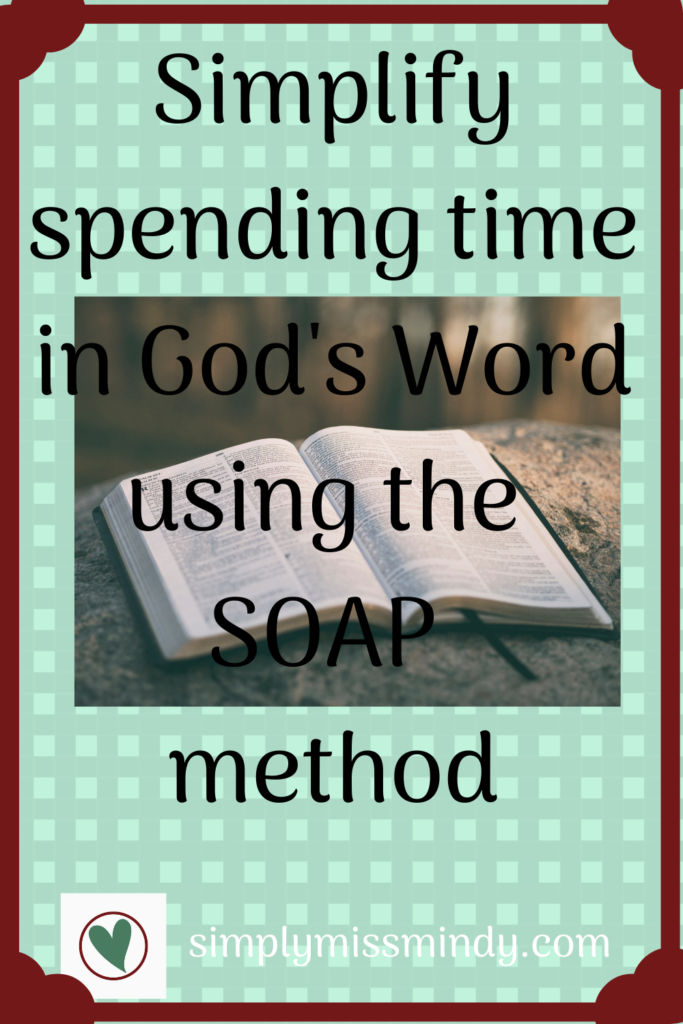
Hey, listen: if you consider yourself a follower of Jesus, you absolutely need to be spending time in God’s Word. You need to know Him and hear from Him, and in order to do that, you need to be regularly studying your Bible.
Let me tell you, I have no intention of laying a guilt trip on anyone. I know what it’s like to feel like you don’t have even a minute to spare. I know what it’s like to go days, weeks, months without cracking open my Bible. I love Jesus, but there have definitely been times in my life when I wasn’t spending time with Him or in His Word. I get it. No judgement.
If you are anything like me, the longer you go without studying your Bible, the harder it becomes. You feel guilty, and you’ve missed so much of your reading plan, and you don’t even know where your notebook is where you were writing down what you learned, and every day that goes by just makes it that much harder.
I think that sometimes we just overcomplicate it, to tell you the truth. We feel like our time has to be formal, and we need to read a whole bunch in order to really get something out of it.
The whole Bible, in its entirety, is important. Every Word is inspired and intentional. I do recommend that you find a reading plan that takes you through the whole Bible, and when you’ve finished, start again, and again, and again. Don’t worry if you miss a day or seventy-two. Jump right back in and continue where you left off. I like to do this one-year reading (which commonly takes me several years) at night before I sleep, so that I am thinking about the Word as I drift off.
But for your everyday, regular reading and studying time, I’d like to suggest a simple method that will give you something to meditate on every single day. A way to be in God’s Word daily and hear His voice and know His instructions to you. It’s called the SOAP method.
I learned about this method about 20 years ago from my pastor, and I’ve adapted it to my own use. I like it because it gives me a clear way to look at a scripture and hear what God is speaking directly to me through that scripture.
SOAP is an acronym that stands for Scripture, Observation, Application, and Prayer. Let me tell you how it works.
First, you will need a couple of tools. I recommend a notebook that is just for your personal Bible study time, kept right where you will use it each day. You’ll also need a pen, of course; and a “verse of the day” program or website or app or book. I have the Bible app on my phone, and each day it gives me, on the homepage, the verse of the day. Tell you the truth, I don’t know who chooses what the day’s verse is, and it doesn’t really matter. I like that they come from both the New and Old Testaments, from the books of poetry, and gospels, and prophecy, and law. There are lots of websites that will send you a daily verse if you subscribe, and books you can get that have a verse for every day of the year. (I don’t prefer the books, because you would repeat verses you’ve already studied unless you are willing to buy a new book each year.)
So let’s say you’ve found your source for a daily verse. Schedule a time every day to sit down with your Bible. I know it’s hard. I know you’re busy and you don’t have any extra time. But I’m telling you, with everything I have in me, that you NEED this.
A quick aside, if you will allow me. I plan to write an entire post about this in the coming weeks, but let me give you a little preview of something I’ve learned: routines create habits, and habits are sustained by routines. What I mean by this is that whether you realize it or not, you are in some kind of routine in your life. It may be that your routine is to wake up when your kids start making noise each morning and then frantically run around trying to get things done all day long, falling into bed at the end. Or perhaps your routine is that the moment you wake up, you stumble into the kitchen to make a cup of coffee and jump into the shower, barely getting ready in time to get out the door. These routines have caused you to develop habits, and every time you practice your routine you solidify your habits.
But you can change your habits by changing your routines. It won’t be easy, because your habits have become deeply ingrained; but it can be done. What you have to do is to develop new routines that circumvent those old habits and create new ones.
Let me give you an example. Let’s say you spend five minutes each morning looking for your keys. You do this because your evening routine has been to set your keys down in whatever place you happen to set them, and that is a different place every day. If you want to develop the habit of always putting your keys in the bowl on the entryway table, you need to develop a new routine. That routine looks like this: no matter what I’m carrying, no matter which door I came in, rain or shine, I always, always walk to the entry way and put my keys in the bowl before I do anything else. Always. You tell yourself this is your new routine, and you practice it over and over and over again until it becomes your habit, and voila! You no longer spend any time in the morning looking for your keys, because they are always in the bowl.
The same concept applies to spending time in God’s Word. You have to develop a routine that includes Bible study time, and practice it over and over again until it becomes a habit. I recommend finding a way to make this a morning routine, so that you set off on your day with your spiritual cup filled, but if that absolutely can’t happen, find another time during the day. Develop a routine that will sustain your habit of studying your Bible.
So, now you have your tools, and you have some time set aside. Now it’s time to SOAP.
SCRIPTURE
You start by opening up your Bible, or your app, or your book, to the verse of the day. Read it through once, and then get out your notebook. Write the date at the top of a new page, and then write the day’s Scripture at the top of the page. Write out the whole verse and the reference. Don’t skip this part. There’s something about writing it out that helps it to stick in your brain. As you write, focus on the words and the meaning. Read it out loud as you write if you feel comfortable doing so. This is the S.
OBSERVATION
Next, you are going to write your Observation. Just things you notice.
Let me give you an example from my own study. My verse today is Psalm 119:105: Your Word is a lamp to my feet and a light to my path. Here are my observations:
Your Word is a lamp. A lamp provides light. It makes things easier to see. I can turn it on, or I can turn it off. Oil lamp: I can light it, or snuff it out. It illuminates what I need to see. It makes my room light so I don’t trip and fall. It is a lamp to my feet. It’s shining directly where my feet are going. It makes it safe to walk where I’m supposed to. I carry it with me, if it’s an oil lamp like in Old Testament times, so I never have to be without it. A lamp is something I control. A light, though, like from the sun, is a gift from God to me. It illuminates not just my feet but also the whole path ahead of me. God’s word is both a lamp and a light. I carry it with me, and it’s a gift He gives.
I bet you have read or heard that verse a hundred times, but if you haven’t taken the time to observe what it’s saying, maybe it hasn’t penetrated your heart like it needs to. Write down everything you observe in the verse. Don’t worry about spelling, or punctuation, or grammar; just write what you see.
APPLICATION
Then it’s time for Application. What is this verse saying directly to you, right now, in your situation? Here is what I wrote:
I don’t want to snuff out the lamp. I need to keep it burning all day and night, all the time, by continuing to feed it. An oil lamp needs to be refilled; my lamp is filled when I spend time in God’s Word and prayer. I carry His Word with me if I have planted it in my heart. He also gives me light; He illuminates my path ahead through His Word, both through reading the Bible and spending time in prayer. He will show me the right path in every situation through His Word.
Do you see the difference between observation and application? Observation is neutral, just the things you see. Application is God speaking directly to you and telling you how to apply this scripture in your life and your situation.
PRAYER
End by writing down your prayer regarding what you learned. Pray for the strength to do what He has shown you He wants you to do. Thank Him for revealing His heart to you. Whatever God leads you to pray, write it down. And take it to the Lord and spend time in prayer.
Now, I like to add one more step. You know the post on planners is coming, and here’s yet another preview of how your planner can change your life. I like to take my planner and write the verse in today’s spot. If it’s particularly long, I’ll write just the reference, but I try to get the whole verse in. Then, as I look in my planner throughout the day, I am reminded of what God showed me in my time with Him, and the lessons go even deeper into my heart. If you are trying to memorize more scripture, this is a good way to accomplish it too, because you are reading the verse over and over throughout the day.
And there you have it: the SOAP method of daily Bible study. Now, I think there’s definitely time to study things more in-depth, and other reading to do, such as reading all the way through the Bible, as mentioned above. But if you are looking for a way to get God’s Word into your heart and mind on a daily basis, SOAP can be a very powerful way to do that.
What do you think? Are you ready to try to develop a habit of daily Bible study? Let me know in the comments if you’ve tried it and if this method worked for you.
Blessings, Mindy
